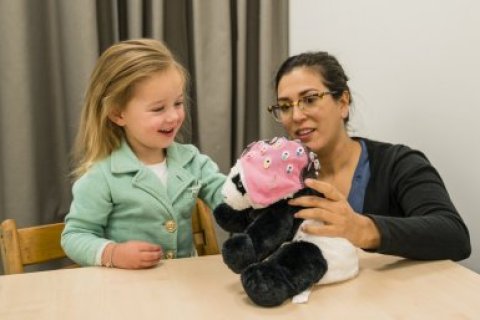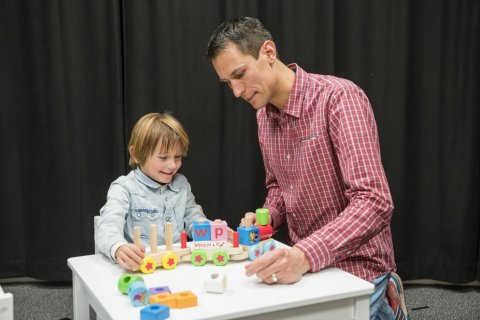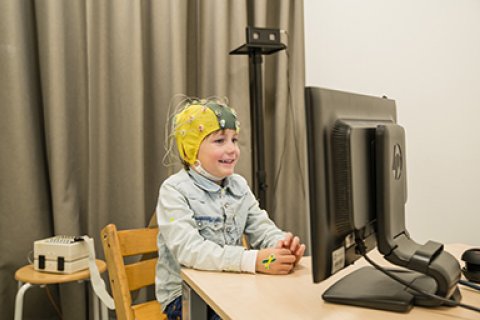The YOUth Study
Long-term research into the healthy development of children
Everyone wants children to grow up happy and healthy. While they often do, problems can sometimes arise. In order to properly support each child, we need to understand what happens as they are growing up. That is why the YOUth study, a long-term study by Utrecht University and University Medical Center Utrecht, has been set up in Utrecht.

Focus on the brain
YOUth is not a study into specific disorders, but instead concentrates on the healthy development of social skills and self-control with a focus on the brain. Chantal Kemner, principal researcher for YOUth, says, ‘It's about the nuances. Autism, or another psychiatric disorder, is a gradation. You cannot simply draw a line and say, from here you're autistic and from there you're not. People differ in this respect. The question is how normal development in children proceeds. YOUth has its origins in this concept.' If we have a better understanding of why some children grow up without problems and others do not, we can better guide and help the children who need it.
Social skills and self-control
The research focuses on social skills and self-control: how do you deal with others and how well can you control your impulses? If a child's development does not go well in one or both of these areas, it can lead to problems. Good social skills and self-control are required in our society, because you have to cooperate a lot with different kinds of people. Self-control also plays a role in how you deal with others and in how you deal with problems or with issues such as money, food and substance use. Therefore, social skills and self-control both have a considerable influence on how you develop and how you fare as an adult.
With YOUth, we want to lead the way when it comes to open science, because we believe that this is the path to sustainable and transparent science.
Extensive data set
The data that the researchers from the Youth study are collecting are unique and extensive, including data such as 3D ultrasound images of the foetal brain, eye tracking, EEG, (f)MRI, computing tasks, cognitive measurements and parent-child observations. In addition, data are derived from a wide range of questionnaires on behaviour, personality, health, lifestyle, upbringing, child development, use of social and other media and more. Furthermore, umbilical and other blood samples, cheek swabs, saliva and hair samples are collected.

Reuse of data
Through YOUth, babies and children are followed for years. More than 3,500 children are already participating in YOUth and providing a wealth of data. These data are available for scientific research. Coosje Veldkamp, project manager at YOUth: ‘With YOUth, we want to be at the forefront of open science. Answering multiple research questions with the same dataset is much more efficient than when researchers collect their own data. Research funds are thus spent in a more sustainable way.’ Together with the university library, we are constantly working on optimising FAIR and Open Data and making them available. Open data are not “open” in the sense that all the data are out in the open. It is about transparency and the proper use and re-use of data by scientists, so that the quality and reliability of research can be increased.
YOUth data are available to all researchers. If you can answer multiple research questions with the same data set, it is much more efficient. Research funds are thus spent in a more sustainable way.

Huge numbers
With 3,500 participants, YOUth offers a lot of high-quality data, and there will be more. People can still participate. Veldkamp: ‘In science, and certainly in psychology, the importance of having large groups of test subjects has been underestimated for decades. For a long time, it was quite normal to do scientific research with 30 or 40 test subjects. But when scientists later repeated the same study, they often got very different results. Small studies therefore definitely do not always provide reliable data. Over the past decade, there has been a growing realisation that large studies with hundreds or even thousands of subjects are a much better investment of money, resources and expertise. It requires a lot of organisation and logistics, including with regard to ICT, but it's worth it.’
Sharing expertise
YOUth is characterised by its focus on the long term, by the breadth and depth of its research, but also by the high standard of all its preconditions. Actually, through YOUth, a kind of factory has been built in which high-quality data are produced and people are trained. All of this has been done using clear manuals and protocols with regard to facilities, rooms, medical ethics issues and the collection, storage and use of data.
We also actively share our expertise, experience, manuals and protocols with other parties.
This broader expertise is certainly also what, according to Veldkamp, is piquing the interest of scientists and external parties alike. ‘We also actively share our expertise, experience, manuals and protocols with other parties. The interest in this also gives us the opportunity to get to know and network with possible future cooperation partners.’
COVID19-data
Through YOUth, additional research is being done on the health and well-being of children and parents during the coronavirus pandemic. We measure family stress using additional questionnaires, but we also have measurements from before, during and after the coronavirus pandemic. This makes the data of YOUth participants especially valuable. This data from YOUth in relation to the pandemic are also available to researchers. The COVID-19 infographic (in Dutch) summarises the initial results.
More information
YOUth data are available for researchers. You can find more information on the YOUth website.

